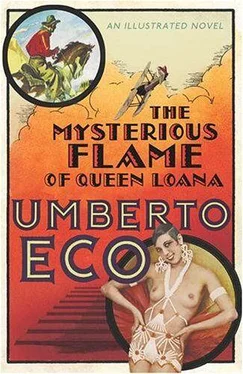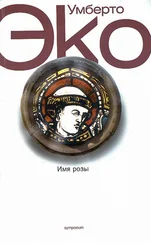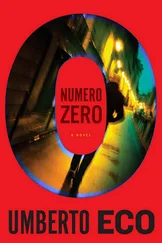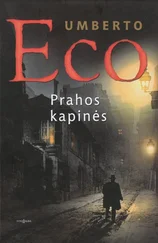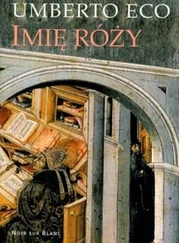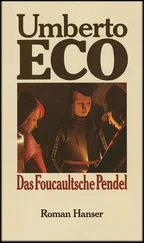Umberto Eco - The Mysterious Flame Of Queen Loana
Здесь есть возможность читать онлайн «Umberto Eco - The Mysterious Flame Of Queen Loana» весь текст электронной книги совершенно бесплатно (целиком полную версию без сокращений). В некоторых случаях можно слушать аудио, скачать через торрент в формате fb2 и присутствует краткое содержание. Жанр: Исторический детектив, на французском языке. Описание произведения, (предисловие) а так же отзывы посетителей доступны на портале библиотеки ЛибКат.
- Название:The Mysterious Flame Of Queen Loana
- Автор:
- Жанр:
- Год:неизвестен
- ISBN:нет данных
- Рейтинг книги:3 / 5. Голосов: 1
-
Избранное:Добавить в избранное
- Отзывы:
-
Ваша оценка:
- 60
- 1
- 2
- 3
- 4
- 5
The Mysterious Flame Of Queen Loana: краткое содержание, описание и аннотация
Предлагаем к чтению аннотацию, описание, краткое содержание или предисловие (зависит от того, что написал сам автор книги «The Mysterious Flame Of Queen Loana»). Если вы не нашли необходимую информацию о книге — напишите в комментариях, мы постараемся отыскать её.
The Mysterious Flame Of Queen Loana — читать онлайн бесплатно полную книгу (весь текст) целиком
Ниже представлен текст книги, разбитый по страницам. Система сохранения места последней прочитанной страницы, позволяет с удобством читать онлайн бесплатно книгу «The Mysterious Flame Of Queen Loana», без необходимости каждый раз заново искать на чём Вы остановились. Поставьте закладку, и сможете в любой момент перейти на страницу, на которой закончили чтение.
Интервал:
Закладка:
And then there were the colonial beauties, because even though Negroid types resembled apes and Abyssinians were plagued by a whole host of maladies, an exception had been made for the beautiful Abyssinian woman. The radio sang: Little black face / sweet Abyssinian / just wait and pray / we’re nearing our dominion / Then we’ll be with you / and gifts we’ll bring / yes we will give you / a new law and a new King.
Just what should be done with the beautiful Abyssinian woman was made clear in De Seta’s color cartoons, which featured Italian legionnaires buying half-naked, dark-skinned females in slave markets and sending them to their pals back home, as parcels.
But the feminine charms of Ethiopia had been evoked from the very beginning of the colonial campaign in a nostalgic caravan-style song: They’re off / the caravans of Tigrai / toward a star that by and by / will shine and glimmer with love.
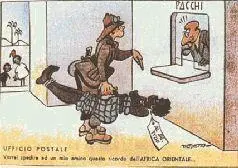
And I, caught in this vortex of optimism, what had I thought? My elementary-school notebooks held the answer. It was enough to look at their covers, which immediately invited thoughts of daring and triumph. Except for a few that contained thick, white paper (they must have been more expensive) and bore on their covers the portraits of Great Men (I must have done some woolgathering around the name and the enigmatic, smiling face of a gentleman called Shakespeare-which I no doubt pronounced as it was spelled, with four syllables-seeing that I had gone over all the letters in pen, as if to interrogate or memorize them), the notebooks boasted images of Il Duce on horseback, of heroic combatants in black shirts lobbing hand grenades at the enemy, of slender PT boats sinking enormous battleships, of couriers with a sublime sense of sacrifice, who though their hands have been mangled by a grenade run on beneath the crackle of enemy machine guns, carrying their messages between their teeth.
Our headmaster (why headmaster and not headmistress? I do not know, but I could hear myself saying "Mr. Headmaster") had dictated to us the key passages from Mussolini’s historic address on the day he declared war, June 10, 1940, inserting, following the newspaper accounts, the reactions of the oceanic audience listening to him in Piazza Venezia:
Combatants on land , at sea , and in the air! Blackshirts of the revolution and of the legions! Men and women of Italy , of the Empire and of the kingdom of Albania! Listen! An hour signaled by destiny is striking in the skies of our fatherland. The hour of irrevocable decisions. The declaration of war has already been delivered (cheering, deafening cries of "War! War!") to the ambassadors of Great Britain and of France. We are going to battle against the plutocratic and reactionary democracies of the West , who at every turn have hindered the advance and often threatened the very existence of the Italian people…
According to the laws of Fascist morality , when one has a friend one marches with him wholeheartedly. (Shouts of "Duce! Duce! Duce!") This is what we have done and will do with Germany , with her people , with her marvelous armed forces. On the eve of this event of historic import , we turn our thoughts to his Majesty the Emperor King (the multitudes erupt in great cheers at the mention of the House of Savoy), who , as always , has understood the spirit of the fatherland. And we salute the Führer , the head of allied Greater Germany. (The crowd cheers at length at the mention of Hitler.) Italy , proletarian and Fascist , is on her feet for the third time , strong , proud , and united as never before. (The multitude cries out in a single voice: "Yes!") The watchword is one word only , categorical and binding for all. It has already taken wing , stirring hearts from the Alps to the Indian Ocean: Victory! And we will win! (The crowd erupts in deafening cheers.)
It was in those months that the radio must have begun playing "Victory," echoing the word of the Chief:
Steeled by a thousand passions , the voice of our nation rang clear! " Centuries , Cohorts , and Legions , attention , the hour is here! " March onward , young men!
Who holds us back
or blocks our track ,
we’ll knock them aside!
Slaves never again!
Our hands won’t be tied
like prisoners by our own sea!
Victory , victory , victory!
We will triumph in the air , on land , at sea!
The highest powers say
it’s the watchword of the day:
Victory , victory , victory!
At any cost: nothing will stand in our way!
Our hearts are eager to obey
even to our last breath.
And our voices swear today:
Victory or death!
How might I have experienced the beginning of a war? As a great adventure, undertaken at the side of my German comrade. His name was Richard, as the radio informed me in 1941: Comrade Richard , welcome … I learned how I, in those glorious years, might have imagined my comrade Richard (the song’s rhythm obliged us to pronounce that name like the French Richard , rather than the German Richard ) from a postcard, on which he appeared alongside an Italian comrade, both in profile, both masculine and decisive, their gaze fixed on the finish line of victory.
But my radio, after "Comrade Richard," was already playing (by this point I was convinced it was a live broadcast) a different song. This one was in German, a sad dirge, almost a funeral march that seemed to me to keep time with some imperceptible rhythm in my gut, sung by a woman whose voice was deep and hoarse, mournful and sinful: Vo r d e r Kaserne / Vor dem großen Tor / Stand eine Laterne / Und steht sie noch davor…
My grandfather had owned the record, but in those days I would not have understood the German.
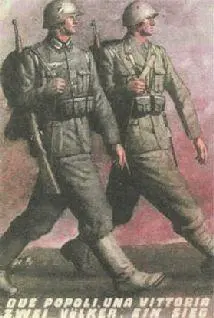
And indeed I listened next to the Italian version, which was more a paraphrase or an adaptation than a translation:
Every evening
beneath the streetlamp’s glow
not far from the garrison
I waited for you to show.
I’ll be there this evening too,
forgetting all the world with you,
with you, Lili Marleen,
with you, Lili Marleen.
When I must walk through the muck and mire beneath my heavy pack I feel unsure and tired.
Where will I go? What will I do? Then I smile and think of you , of you , Lili Marleen , of you , Lili Marleen.
Though the Italian lyrics fail to say so, in the German the streetlamp emerges from the fog: Wenn sich die späten Nebel drehn , when the late fog swirls. But in any case, in those days I would not have understood that the sad voice in the fog beneath that streetlamp (my concern then was probably how a streetlamp could have been lit during a blackout) belonged to the mysterious pitana , "the woman who sells by herself." That song must be why, years later, I took note of this passage from Corazzini’s poem "The Streetlamp": Murky and scant in the lonely thoroughfare , / in front of the bordello doors , it dims , / and the good smoke that from the censer swims / might be this fog that whitens out the air.
Читать дальшеИнтервал:
Закладка:
Похожие книги на «The Mysterious Flame Of Queen Loana»
Представляем Вашему вниманию похожие книги на «The Mysterious Flame Of Queen Loana» списком для выбора. Мы отобрали схожую по названию и смыслу литературу в надежде предоставить читателям больше вариантов отыскать новые, интересные, ещё непрочитанные произведения.
Обсуждение, отзывы о книге «The Mysterious Flame Of Queen Loana» и просто собственные мнения читателей. Оставьте ваши комментарии, напишите, что Вы думаете о произведении, его смысле или главных героях. Укажите что конкретно понравилось, а что нет, и почему Вы так считаете.
